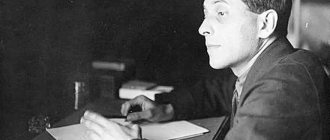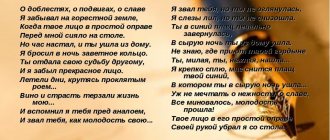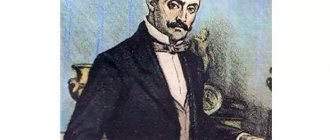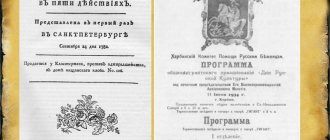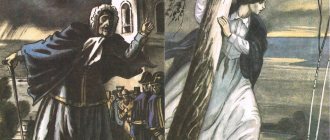The content of the hero's speech
In his famous monologue, Famusov talks about his uncle Maxim Petrovich, whom he sets as an example to Chatsky. The now deceased relative of Pavel Afanasyevich managed to achieve incredible heights in his career (“A century at a court, and at what a court”), he became someone who in the world is always invited “to whist” and who is greeted here with a “friendly word.” However, he achieved his position not through his talent and diligence, but through his ability to bend in time under his superiors.
Despite the fact that he was a serious man, with an arrogant disposition, and then “when it was necessary to serve, he bent over.”
The justification for such flattering behavior among many who wanted to curry favor can be considered the Catherine’s era, when it was precisely such “Famusovs” and “silent people” who had a chance of a good profitable position. Consider the description of Maxim Petrovich’s intelligence from an excerpt of a monologue: “He stood up, straightened up, wanted to bow, but suddenly fell in a row - on purpose.” It is clear that such behavior was unpleasant and alien to Chatsky.
Pavel Afanasyevich even wanted to guide the son of his best friend in a fatherly way. “You would ask, what did the fathers do? We should learn from our elders..." - this is how he narrated, seeing the changed views of the young man. However, to all the pretentious moral teachings included in Famusov’s monologue “Woe from Wit,” Alexander Andreevich Chatsky responded in his characteristic manner: “I would be glad to serve, it’s sickening to be served . It was this phrase that was followed by the famous: “That’s it, you are all proud .
Famusov did not see anything wrong with getting a rank with his “forehead”.
The text of his monologue emphasizes the need to “bend” and “serve.” In this regard, Molchalin is closer to him - modest, respectful, accustomed to serving from a young age, whom he decided to call from Tver.
The role of Chatsky’s monologues in A. S. Griboyedov’s comedy “Woe from Wit”
The comedy “Woe from Wit” was written by A. S. Griboyedov after the Patriotic War of 1812, that is, during the period when profound socio-political changes were taking place in the life of Russia.
With his work, Griboyedov responded to the most pressing issues of our time, such as serfdom, personal freedom and independence of thought, the state of enlightenment and education, careerism and veneration of rank, admiration for foreign culture. The ideological meaning of “Woe from Wit” is the opposition of two ways of life and worldviews: the old, serfdom (“past century”) and the new, progressive (“present century”).
“The present century” is presented in a comedy by Chatsky, who is an ideologist of new views. He expresses his attitude towards everything happening in society. That is why the monologues of the main character occupy such an important place in the play. They reveal Chatsky’s attitude to the main problems of his contemporary society. His monologues also carry a large plot load: they appear in the play at turning points in the development of the conflict.
We meet the first monologue already in the exhibition. It begins with the words “Well, what about your father?..”, and in it Chatsky gives a description of Moscow morals. He notes with bitterness that during his absence in Moscow, nothing has changed significantly. And here for the first time he starts talking about the system of education accepted in society. The children of Russian nobles are raised by foreign tutors “in more numbers, at a cheaper price.” The younger generation is growing up in the belief “that without the Germans we have no salvation.” Chatsky mockingly and at the same time bitterly notes that in order to be considered educated in Moscow, you need to speak “a mixture of French and Nizhny Novgorod languages.”
The second monologue (“And sure enough, the world began to grow stupid...”) is associated with the outbreak of the conflict, and it is dedicated to the contrast between the “present century” and the “past century.” This monologue is maintained in a calm, slightly ironic tone, which is psychologically justified. Chatsky loves Famusov's daughter and does not want to irritate her father. But Chatsky does not want to agree with Famusov, who insults his pride, his views as a free-thinking person. Moreover, this monologue is caused by the moral teachings of Sophia’s father, his advice on how to make a career, using the experience of the unforgettable uncle Maxim Petrovich.
Chatsky categorically disagrees with this. The entire accusatory meaning of the protagonist’s words lies in the fact that he is trying to explain to Famusov the difference between two historical periods, past and present. The Catherine era, which evokes such tenderness in Famusov, is defined by Chatsky as “the age of humility and fear.” Chatsky believes that now different times have come, when there are no people who want to “make people laugh, bravely sacrifice the back of their heads.” He sincerely hopes that the techniques and methods of the nobles of Catherine’s time are a thing of the past, and the new century values people who are truly honest and dedicated to the cause, and not to individuals:
Although there are hunters everywhere to be mean, but nowadays laughter frightens and keeps shame in check, It is not for nothing that sovereigns pity them and few of them.
Third monologue “Who are the judges?” - the most famous and striking monologue of the main character. It occurs at the moment of development of the conflict in the play. It is in this monologue that Chatsky’s views receive the most complete coverage. Here the hero clearly expresses his anti-serfdom views, which later gave critics the opportunity to bring Chatsky closer to the Decembrists. How different the tone of this passionate monologue is from the peace-loving lines of the previous one! Citing specific examples of the manifestation of the monstrous attitude of nobles towards serfs, Chatsky is horrified by the lawlessness that reigns in Russia:
That Nestor of noble scoundrels, surrounded by a crowd of servants;
Zealous, they saved his honor and life more than once during the hours of wine and fights: suddenly he traded three greyhounds for them!!!
Another master sells his serf actors:
But the debtors did not agree to a deferment: Cupids and Zephyrs are all sold out one by one!
“Where, show us, are the fathers of the fatherland, // Which we should take as models?” - the main character asks bitterly. In this monologue one can hear the genuine pain of a man who knows the value of the “fathers of the fatherland,” who are “rich in robbery” and protected from trial by the entire existing system: connections, bribes, acquaintances, position. The new man cannot, according to the hero, come to terms with the existing slave position of the “smart, vigorous people.” And how can one come to terms with the fact that the defenders of the country, the heroes of the War of 1812, the gentlemen have the right to exchange or sell. Chatsky raises the question of whether serfdom should exist in Russia.
Griboyedov’s hero is also outraged by the fact that such “strict connoisseurs and judges” persecute everything freedom-loving, free and defend only the ugly and unprincipled. In this monologue of the hero, the voice of the author himself is heard, expressing his innermost thoughts. And, after listening to Chatsky’s passionate monologue, any sane person should inevitably come to the conclusion that such a state of affairs cannot exist in a civilized country.
With the words “There is an insignificant meeting in that room...” begins another monologue of Chatsky. It marks the climax and resolution of the conflict. Answering Sophia’s question “Tell me, what makes you so angry?”, Chatsky, as usual, gets carried away and does not notice that no one is listening to him: everyone is dancing or playing cards. Chatsky speaks into emptiness, but in this monologue he also touches on an important issue. He is outraged by the “Frenchman from Bordeaux” as an example of the admiration of Russian nobles for everything foreign. With fear and tears, he went to Russia, and then he was delighted and felt like an important person, having not met there “neither a Russian sound nor a Russian face.” Chatsky is offended by the fact that the Russian language, national customs and culture should be placed much lower than foreign ones. He ironically proposes to borrow from the Chinese “the wise... ignorance of foreigners.” And he continues:
Will we ever be resurrected from the alien power of fashion? So that our smart, cheerful people, although by language, do not consider us Germans,
The last monologue comes at the denouement of the plot. Chatsky says here that he will never be able to come to terms with the morals and orders of Famusov’s Moscow. He is not surprised that this society of people, terrified of everything new and advanced, declares him insane:
You are right: he will come out of the fire unharmed, whoever manages to spend a day with you will breathe the same air, and his sanity will survive.
So, Chatsky left the Famusovs’ house offended and disappointed, and yet he is not perceived as a defeated person, a loser, because he managed to remain faithful to his ideals, to remain himself.
Monologues help us understand not only the character of the main character. They tell us about the order that existed in Russia at that time, about the hopes and aspirations of progressive people of that time. They are important both in the semantic and structural construction of the play. Thinking readers and viewers should definitely think about the main problems of Russian society during Griboyedov’s time, many of which are still relevant today.
"Famusovs" then and now
Chatsky became a representative of a new trend that changed the usual social foundations. In his opinion, only a person who has certain qualities can occupy responsible positions:
- education;
- conscientiousness;
- honesty.
Unfortunately, his time had not yet come. And during the reign of Empress Catherine II, Maxim Petrovich still turned out to be smart enough to understand when to bend or make fun of his superiors, despite the pain. And at one time this approach yielded results:
- “all in orders”;
- “I ate on silver... I ate on gold”;
- “hears a friendly word at court”;
- He has a hundred servants in his service.
Famusov, following in the footsteps of his moral mentor, also made quite a decent career and is now trying to lead Molchalin along the same path.
His position as a nobleman, a wealthy landowner and father is quite understandable. If time dictates such standards of behavior, then he will adhere to them, especially since they are for the benefit of him and his family. Chatsky, appearing in Moscow after a long absence (Chekhov does not specify where exactly he was), shocks everyone with his advanced ideas. It is not surprising that Famus society perceives him as “crazy.”
Monologues of Chatsky and Famusov Woe from Wit
And sure enough, the world began to grow stupid, You can say with a sigh; How to compare and see the present century and the past: The legend is fresh, but hard to believe; As he was famous for, whose neck bent more often; How not in war, but in peace they took it head on; They hit the floor without regret! Those who are in need: those with arrogance, they lie in the dust, And for those who are higher, flattery, like weaving lace. It was an age of obedience and fear, all under the guise of zeal for the king. I'm not talking about your uncle; We will not disturb his ashes: But meanwhile, whom will the hunt take, Even in the most ardent servility, Now, in order to make people laugh, Bravely sacrifice the back of the head? And the peer, and the old man Other, looking at that leap, And collapsing in the old skin, Tea, said: - Ah! I wish I could too! Although there are hunters everywhere to be mean, today laughter frightens and keeps shame in check; No wonder the sovereigns favor them sparingly...
Who are the judges? - For the antiquity of years, their enmity is irreconcilable towards a free life, Judgments are drawn from forgotten newspapers of the times of the Ochakovskys and the conquest of the Crimea [1]; Always ready for battle, they all sing the same song, not noticing about themselves: The older, the worse. Where? show us, fathers of the fatherland, whom we should take as models? Aren't these the ones who are rich in robbery? They found protection from court in friends, in kinship, building magnificent chambers, where they spill out in feasts and extravagance, and where foreign clients do not resurrect the meanest traits of their past lives. And who in Moscow hasn’t had their mouths clamped at lunches, dinners and dances? Isn’t it the one to whom I was taken from the shrouds, For some incomprehensible plans, The child was taken to bow? That Nestor of noble scoundrels [2], surrounded by a crowd of servants; Zealous, in the hours of wine and fights, both honor and life saved him more than once: suddenly he exchanged three greyhounds for them!!! Or that one over there, who, for the sake of an undertaking, drove many wagons to the serf ballet from the mothers and fathers of rejected children?! He himself was immersed in mind in Zephyrs and Cupids, Made all of Moscow marvel at their beauty! But the debtors did not agree to a deferment: Cupids and Zephyrs are all sold out one by one!!! These are the ones who lived to see their gray hairs! This is who we should respect in the wilderness! Here are our strict connoisseurs and judges! Now let one of us, Of the young people, be found - an enemy of quest, Without demanding either a place or promotion to rank, He will focus his mind, hungry for knowledge, on science; Or in his soul God himself will arouse a fervor for creative, lofty and beautiful arts - They immediately: robbery! fire! And he will be known to them as a dreamer! dangerous!! - Uniform! one uniform! in their former life, he once covered, embroidered and beautiful, Their weakness, the poverty of reason; And we follow them on a happy journey! And in wives and daughters there is the same passion for the uniform! How long ago did I renounce tenderness towards him?! Now I can’t fall into this childishness; But who wouldn’t follow everyone then? When the guards and others from the court came here for a while, the women shouted: hurray! And they threw caps into the air!
In that room there was an insignificant meeting: A Frenchman from Bordeaux, puffing up his chest, Gathered around himself a clan of the gathering And told how he was preparing for the journey To Russia, to the barbarians, with fear and tears; I arrived and found that there was no end to the caresses; I didn’t meet a Russian sound or a Russian face: as if in the fatherland, with friends; Its own province. Look, in the evening He feels like a little king here; The ladies have the same sense, the same outfits... He is happy, but we are not happy. He fell silent, and here from all sides there was melancholy, and groaning, and groaning. Oh! France! There is no better region in the world! – The two princesses, sisters, decided, repeating the Lesson that had been taught to them from childhood. Where to go from the princesses!
From a distance I sent forth humble wishes, but out loud, So that the unclean Lord would destroy this spirit of Empty, slavish, blind imitation; So that he would plant a spark in someone with a soul, Who could, with word and example, hold us back, like a strong rein, from the pitiful nausea on the other side. Let them call me an Old Believer, But our North is a hundred times worse for me Since I gave everything in exchange for a new way - And morals, and language, and holy antiquity, And stately clothes for another According to the jester's model: Tail in back, in front some wonderful notch, contrary to reason, in defiance of the elements; Movements are connected, and not beautiful to the face; Funny, shaved, gray chins! Like dresses, hair, and minds are short!..
Oh! If we were born to adopt everything, Even if we could borrow a little from the Chinese, the Wise One from them is the ignorance of foreigners. Will we ever be resurrected from the alien power of fashion? So that our smart, cheerful people, although by language, do not consider us Germans. “How to put the European in parallel with the national is something strange! Well, how to translate Madame and Mademoiselle? Really, madam!!” - someone muttered to me... Imagine, everyone here started laughing at my expense. "Madam! Ha! Ha! Ha! Ha! Wonderful! Madam! Ha! Ha! Ha! Ha! terrible!!" - I, angry and cursing my life, prepared a thunderous answer for them; But everyone left me. – Here’s a case with me, it’s not new; Moscow and St. Petersburg - in all of Russia, that a man from the city of Bordeaux, Just opening his mouth, has the happiness of instilling sympathy in all princesses; And in St. Petersburg and in Moscow, Who is an enemy of written out faces, pretentiousness, curly words, In whose head, unfortunately, Five, six there are healthy thoughts And he dares to announce them publicly, - Look...
I don’t come to my senses... I’m guilty, And I listen, I don’t understand, As if they still want to explain to me, Confused by thoughts... I’m waiting for something.
(With fervor.)
Blind! In whom I sought the reward of all my labors! I was in a hurry!.. flying! trembled! Happiness, I thought, was close. Before whom I was so passionately and so lowly Was a waste of tender words! And you! Oh my God! who did you choose? When I think about who you preferred! Why did they lure me with hope? Why didn’t they tell me directly that you turned everything that happened into laughter?! That the memory even disgusted you Those feelings, in both of us the movements of those hearts, Which in me were not cooled by any distance, Neither entertainment, nor a change of place. I breathed and lived by them, was constantly busy! If they told you that my sudden arrival, my appearance, my words, actions - everything is disgusting - I would immediately cut off relations with you, and before parting forever I would not really bother to find out who this dear person is to you?..
(Mockingly.)
You will make peace with him after mature reflection. Destroy yourself, and why! Think, you can always take care of him, and swaddle him, and send him to work. A boy-husband, a servant-husband, one of the wife's pages - the High ideal of all Moscow husbands. – Enough!.. with you I am proud of my breakup. And you, sir father, you who are passionate about ranks: I wish you to slumber in happy ignorance, I do not threaten you with my matchmaking. There will be another who is well-behaved, a low-worshipper and a businessman, and finally, in virtues, he is equal to the future father-in-law. So! I became completely sober, dreams out of sight - and the veil fell; Now it wouldn’t be bad to pour out all the bile and all the frustration on the daughter and the father, and on the foolish lover, and on the whole world. Who was it with? Where fate has taken me! Everyone is driving! everyone curses! A crowd of tormentors, In the love of traitors, in tireless enmity, Indomitable storytellers, Clumsy wise men, crafty simpletons, Sinister old women, old men, Decrepit over inventions, nonsense, - You glorified me as crazy with the whole choir. You are right: he will come out of the fire unharmed, whoever manages to spend a day with you will breathe the same air, and his sanity will survive. Get out of Moscow! I don't go here anymore. I’m running, I won’t look back, I’ll go looking around the world, Where there is a corner for an offended feeling!.. A carriage for me, a carriage!
(Leaves.)
The semantic load of the monologue
Pavel Afanasyevich was right in his own way when he tried to guide Chatsky on the right path. Unfortunately, everything old sooner or later ends, as the “past century” passes and the “present century” begins. Chatsky also conveyed his truth, which turned out to be radically opposite to that accepted in society.
The topic raised is still relevant today. There will always be such a “little” person who, through flattery and servility, achieves a promotion, like Famusov. They try to learn the monologue of the hero from the second scene of the work by heart, since it is not only a short verse, but it is in it that the contradictions in the perception of the world between Pavel Afanasyevich and Alexander Andreevich are revealed.
